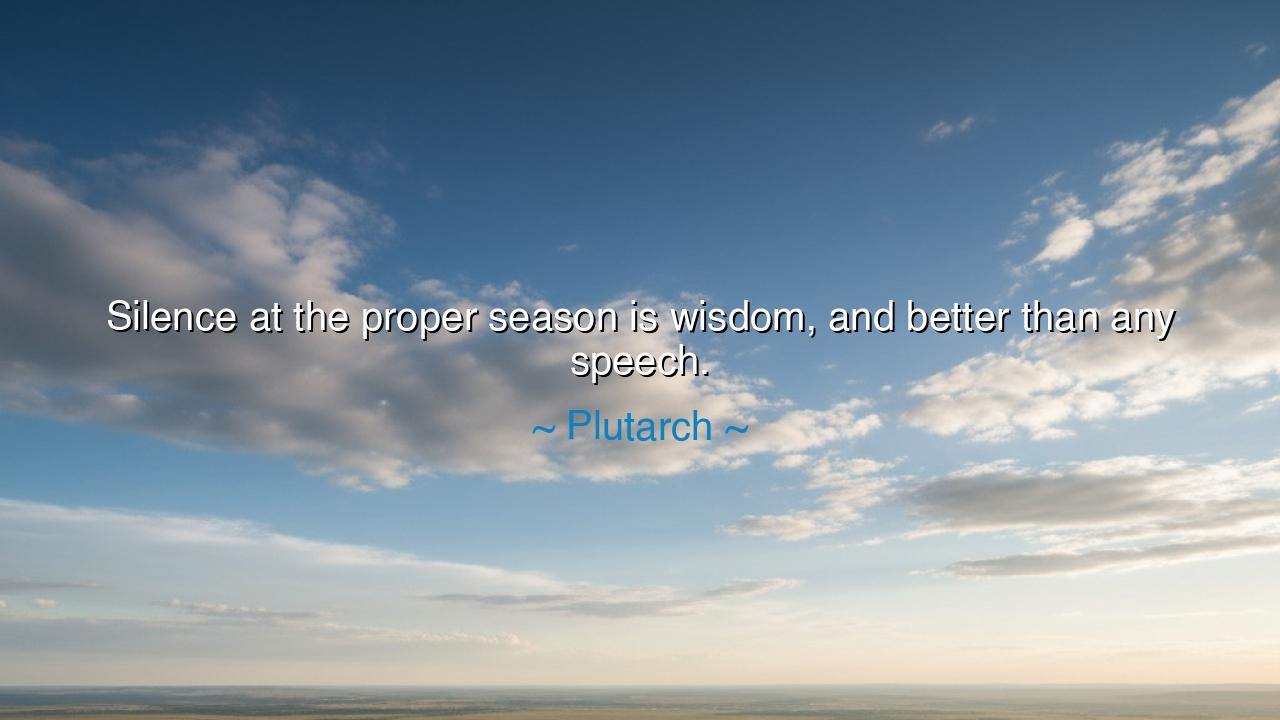
Silence at the proper season is wisdom, and better than any






Hearken, O children of the ages, to the enduring words of Plutarch, who speaks of the profound virtue of silence. He teaches that there are moments in life when restraint, when holding one’s tongue, is the truest measure of wisdom. Words, though powerful, may falter when ill-timed; the silence that comes at the proper season carries weight beyond speech, guiding hearts, tempering conflict, and revealing insight through its very absence.
Plutarch reminds us that silence is not weakness, but strength tempered with discernment. It is the pause that allows understanding to ripen, the space in which reflection prevails, and the veil behind which prudence quietly governs. To speak recklessly is to scatter seeds of confusion; to remain silent with wisdom is to cultivate a garden of clarity and lasting influence. In such restraint, the wise shape events without uttering a single word.
Consider the life of Cicero, the orator and statesman of Rome, whose eloquence was unmatched, yet whose true power often lay in the measured moments of silence. In times of danger, he withheld words that could provoke unnecessary conflict, weighing the consequences with care. His silence, deliberate and discerning, preserved alliances, guided debates, and allowed his counsel to resonate more deeply than speech alone could achieve.
Even in the humbler spheres of life, this principle endures. A teacher listening patiently, a leader restraining a hasty judgment, or a friend who chooses quiet counsel over ill-considered advice all demonstrate that silence is a conduit of wisdom, often surpassing the force of words. By observing and discerning before speaking, the prudent navigate the complexities of human interaction with greater mastery.
O children of the future, carry this teaching within your hearts: know when to speak and, more importantly, when to remain silent. The proper season of restraint may avert disaster, foster understanding, and elevate the spirit above the tumult of rash expression. In the quietude of wisdom, one discovers strength, clarity, and the enduring power that speech alone cannot convey.
If you desire, I can also craft a visual, ancient scroll-style presentation of this passage to capture the heroic, timeless, and deeply reflective essence of Plutarch’s teaching on silence and wisdom.






TDNguyen Thi Thuy dung
This statement makes me curious about the ethical dimension of silence. Are there situations where remaining silent is morally preferable to speaking, and conversely, are there times when silence could be harmful? How do we discern when our voice is necessary to uphold truth or justice versus when it might cause more harm than good? I’d love a perspective on practical strategies for mastering this balance in daily life.
BCbrain cute
I feel challenged by the thought that I might often speak when silence would have been wiser. It raises a concern about the consequences of unnecessary words. Could overcommunication be a sign of insecurity rather than wisdom? How might embracing silence change our interactions, especially in moments of tension or negotiation? I’d like to see examples where remaining quiet transformed a situation for the better.
LLam
I’m intrigued by the idea that silence could be more powerful than speech. Could it be that listening carefully and observing before responding is a form of intelligence that modern society undervalues? I wonder if leaders, thinkers, or even friends who practice strategic silence are more effective communicators. How can one balance the need to contribute with the wisdom of withholding commentary?
YNHa Thi Yen nhi
This makes me reflect on personal relationships. Are there times when saying nothing could prevent conflict or misunderstanding? Sometimes I fear that my silence might be misread as indifference rather than insight. How can one cultivate discernment to know when silence truly serves better than words? Is this an innate skill, or something learned through experience and reflection?
SAnam sung a
I find myself wondering how often we truly recognize the right moment to stay silent. In our fast-paced world, speaking up seems almost mandatory, yet perhaps wisdom lies in restraint. Could it be that our impulse to express ourselves sometimes overshadows the clarity that silence might bring? I’d love to explore how cultures or societies view silence—is it always seen as virtue, or can it be misinterpreted as weakness?